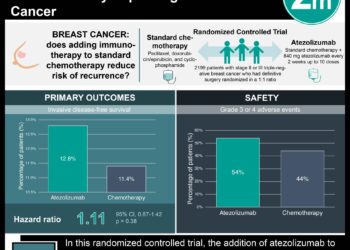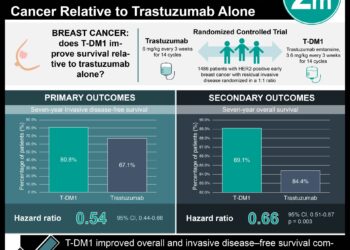Post-mastectomy breast reconstruction may improve survival outcomes
1. Breast reconstruction patients had an observed survival advantage over controls after adjusting for age, tumor size, lymph node status and size of hospital.
2. There was no significant difference in risk of death from breast cancer between breast reconstruction patients and controls in the early and late stages of follow-up.
Evidence Rating Level: 2 (Good)
Study Rundown: Breast cancer is one of the most frequently diagnosed cancers today. Mastectomy is often the treatment of choice, however this procedure leaves a long-term deformity resulting in a potentially reduced patient quality of life. Breast reconstruction is a surgical option that can be used to restore cosmesis post-mastectomy, but it is significantly underused due to concerns that there may be impaired detection of locoregional recurrence. In this study, the authors therefore evaluated whether breast reconstruction following mastectomy had any effect on overall or breast cancer specific survival outcomes. No evidence of worse survival outcomes in the breast reconstruction group compared with the mastectomy alone group was appreciated. Breast reconstruction was associated with apparent survival advantage, namely at the intermediate stage of follow-up after adjustment of confounders. An important strength of this study was its large sample size with a follow-up period of over 20 years. However, its limitations included an observational study design and the potential for missed confounders to explain apparent survival advantage in the breast reconstruction group.
Click to read the study in Plastic and Reconstructive Surgery
Relevant Reading: Delayed breast reconstruction with implants after invasive breast cancer does not impair prognosis.
In-Depth [retrospective study]: A total of 758 matched pairs of women who underwent mastectomy alone and women who underwent additional post-mastectomy breast reconstruction were included for study. Population-based data from the Ontario Cancer Registry (1980 to 1990) was used to identify patients and the median follow-up was 23.4 years (IQR 1.1 to 33.0 years). An extended Cox hazards model was then used to compare overall and breast cancer-specific survival between the mastectomy alone and breast reconstruction groups. Secondary analysis was done to examine whether there was any difference across early, intermediate and late stages of follow-up. Compared to the mastectomy alone group, the breast reconstruction group had similar survival outcomes during the first 10 years(breast cancer-specific survival HR 0.94, 95%CI 0.76-1.15, p = 0.54) and last 10 years (breast cancer-specific survival HR 0.59, 95%CI 0.31-1.10, p = 0.097) of follow-up. Between 10-20 years of follow-up, there was a significant survival advantage for the breast reconstruction group over the mastectomy alone group (breast cancer-specific survival HR 0.63, 95%CI 0.56-0.86, p = 0.0042).
Image: PD
©2015 2 Minute Medicine, Inc. All rights reserved. No works may be reproduced without expressed written consent from 2 Minute Medicine, Inc. Inquire about licensing here. No article should be construed as medical advice and is not intended as such by the authors or by 2 Minute Medicine, Inc.







